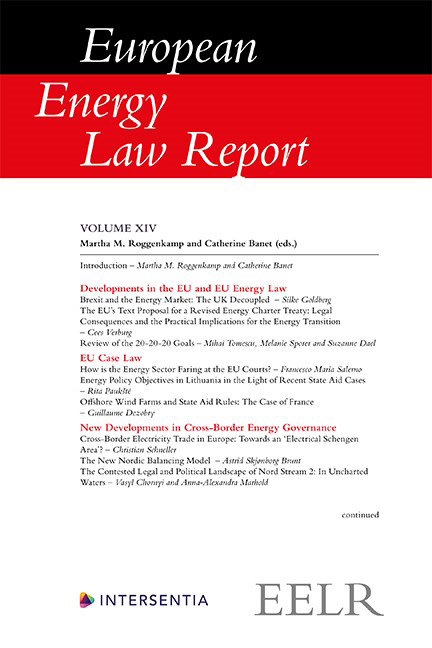Chapter X - Energy Communities in the EU: Challenges for the Implementation of the EU Legal Framework
Published online by Cambridge University Press: 26 May 2022
Summary
INTRODUCTION
The concept of ‘energy communities’ is a novelty introduced into EU law by Directive 2019/944 (hereinafter the ‘E-Directive’) and Directive 2018/2001 (hereinafter ‘REDII’) under the names ‘citizens’ energy communities’ (CECs) and ‘renewable energy communities’ (RECs) respectively. These Directives provide a regulatory framework for individual prosumers under the heading of ‘active customers’ and ‘renewable self-consumers’, and for collective prosumers under the name of energy communities. This latter concept is new and intends to recognize, regulate and support collective engagement of citizens and other eligible, non-professional, entities in energy generation, supply, energy sharing and other activities in the energy sector. The proposal for introducing energy communities into existing EU law came from an observation that citizen initiatives had already been developed in some Member States and that such initiatives would not only bring monetary benefits to their founders, but would also generate social and environmental value. Engaging citizens also proved to be a successful remedy for public opposition to the construction of renewable generation facilities, in particular wind farms.
The new provisions on energy communities are also to ensure that the establishment and the operation of these communities is viable in the long run and is not motivated by short-term benefits based on tax evasion or avoiding network charges. Nevertheless, during the legislative process, some stakeholders expressed a number of concerns regarding the clarity and the potential impact of these energy communities on the energy sector as a whole. Even though the adopted versions of both Directives intended to address those concerns and the initial Commission proposals have been significantly modified, the implementation may still face several challenges. These relate primarily to the strict requirements and complex governance rules provided by the Directives and the fact that the concept is regulated by two Directives with different but overlapping scopes, as well as to the way in which this new concept would affect existing frameworks for citizen initiatives developed in several Member States.
- Type
- Chapter
- Information
- European Energy Law Report , pp. 197 - 218Publisher: IntersentiaPrint publication year: 2021
- 1
- Cited by



